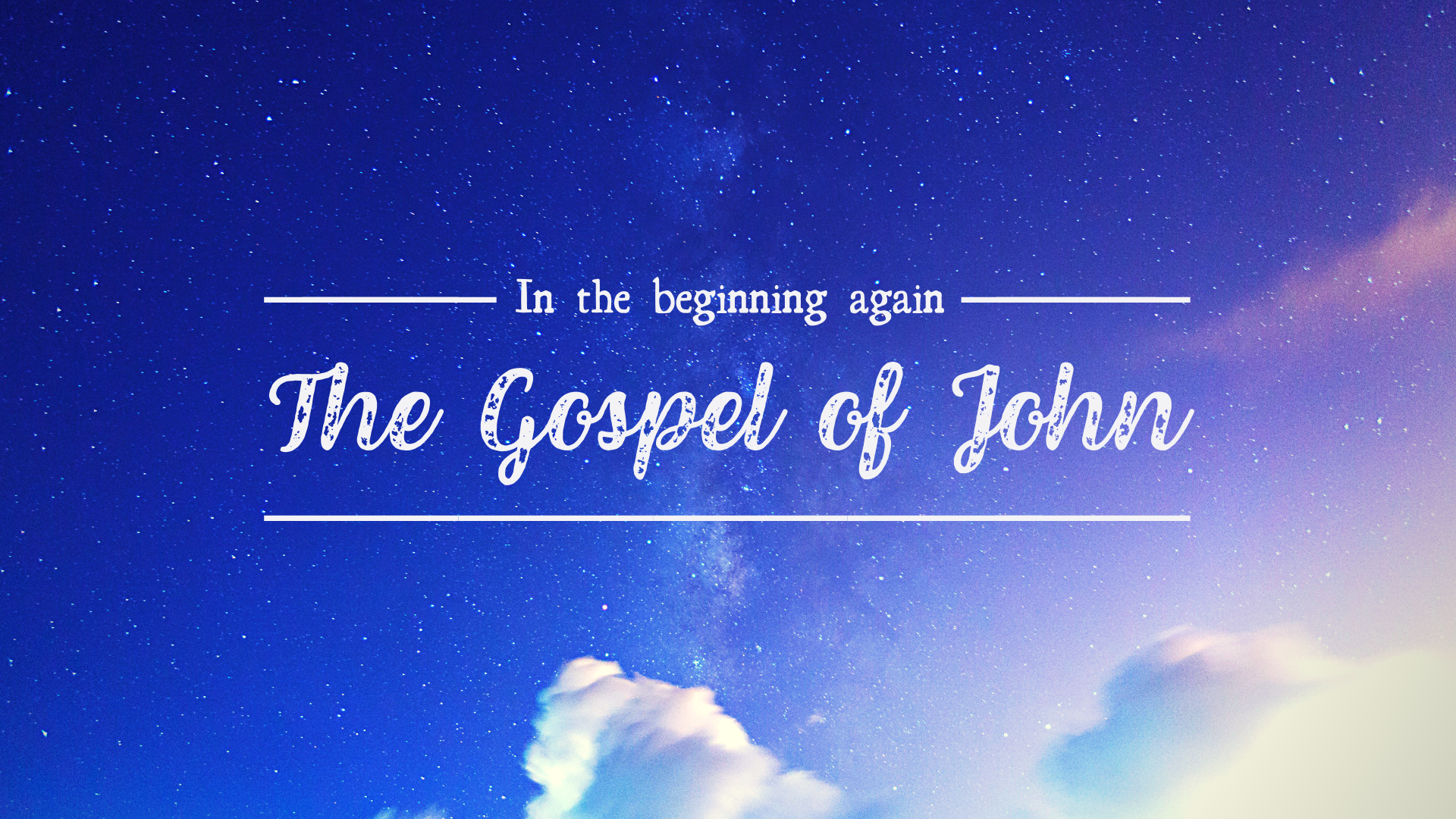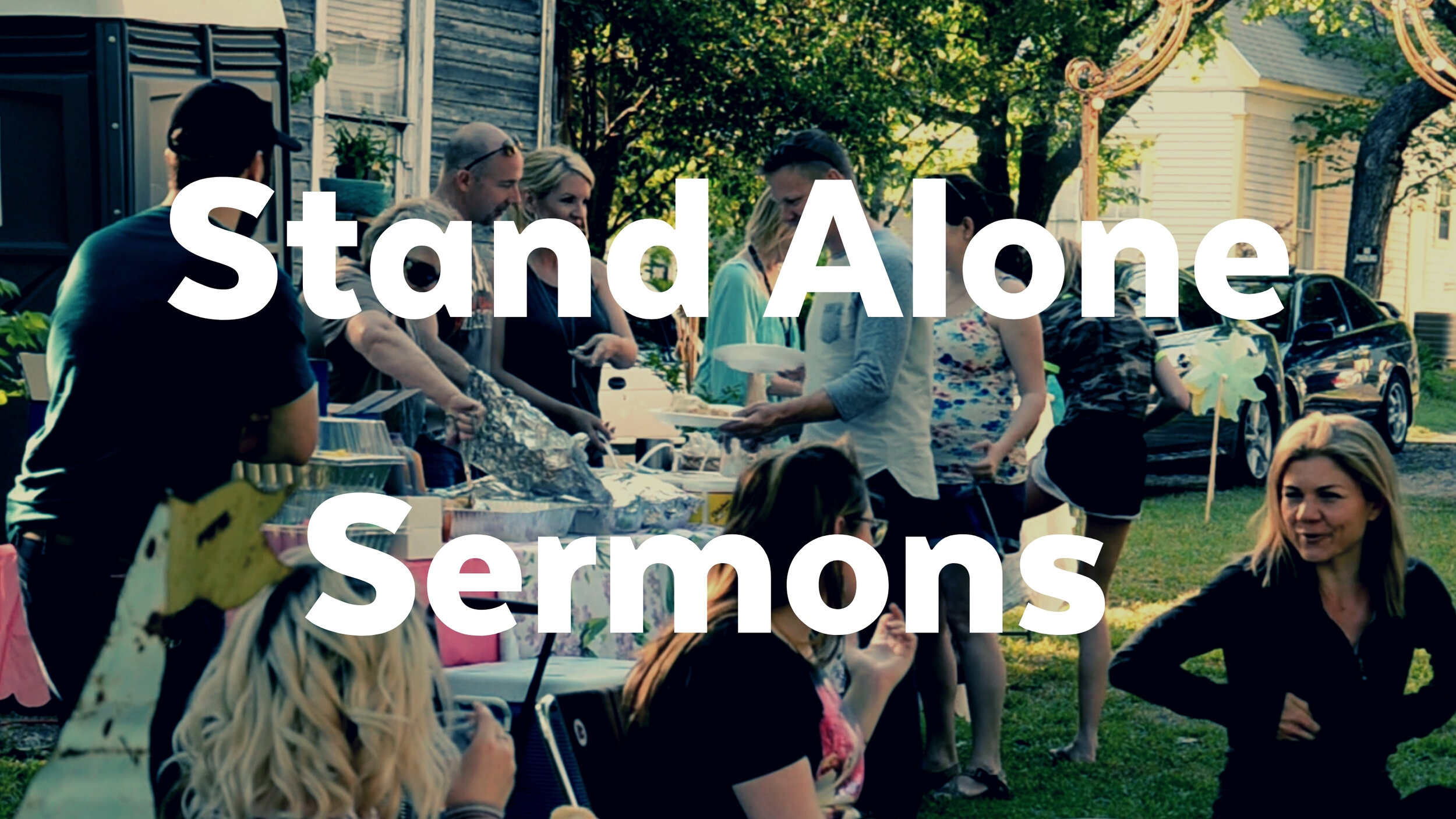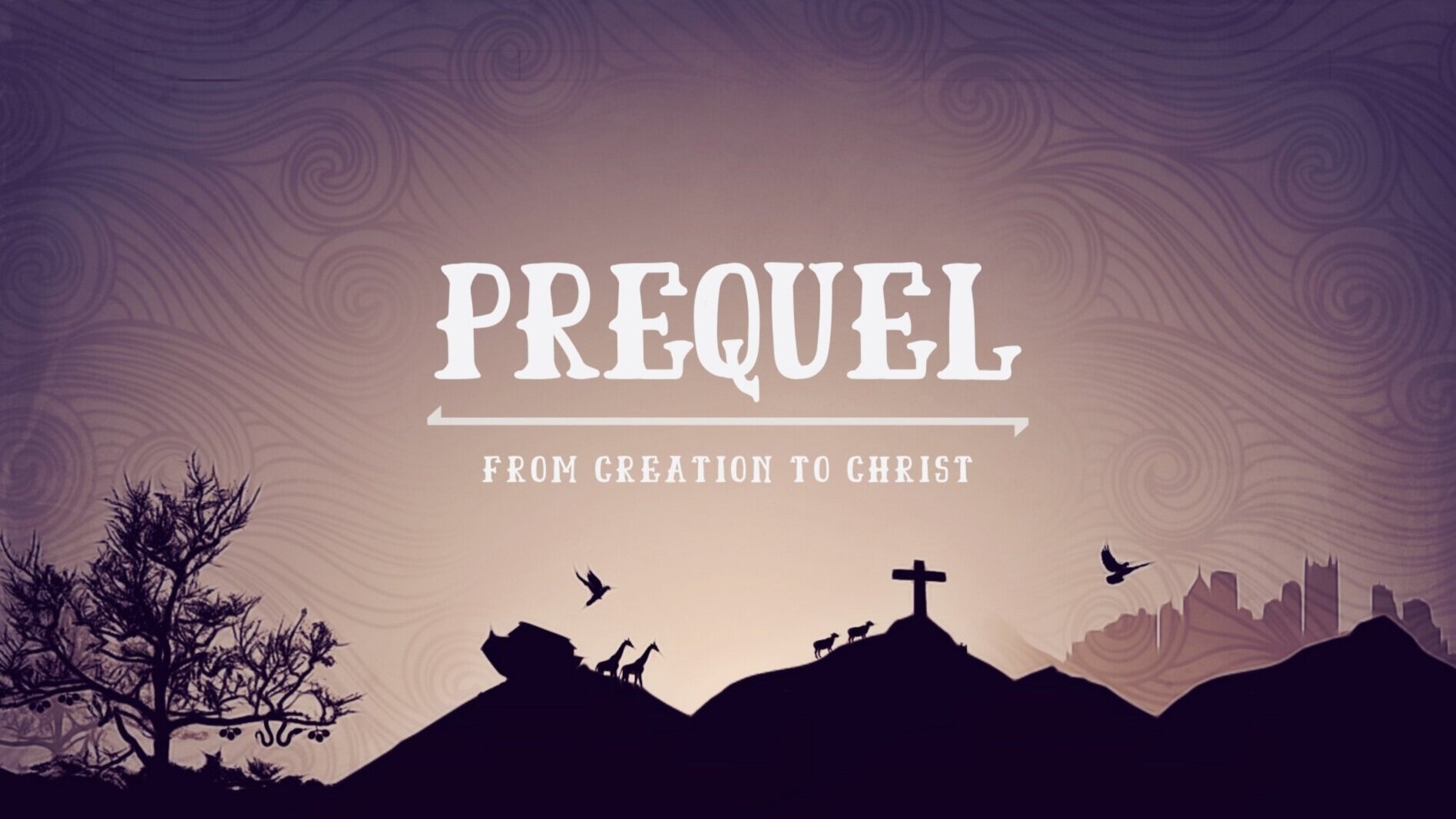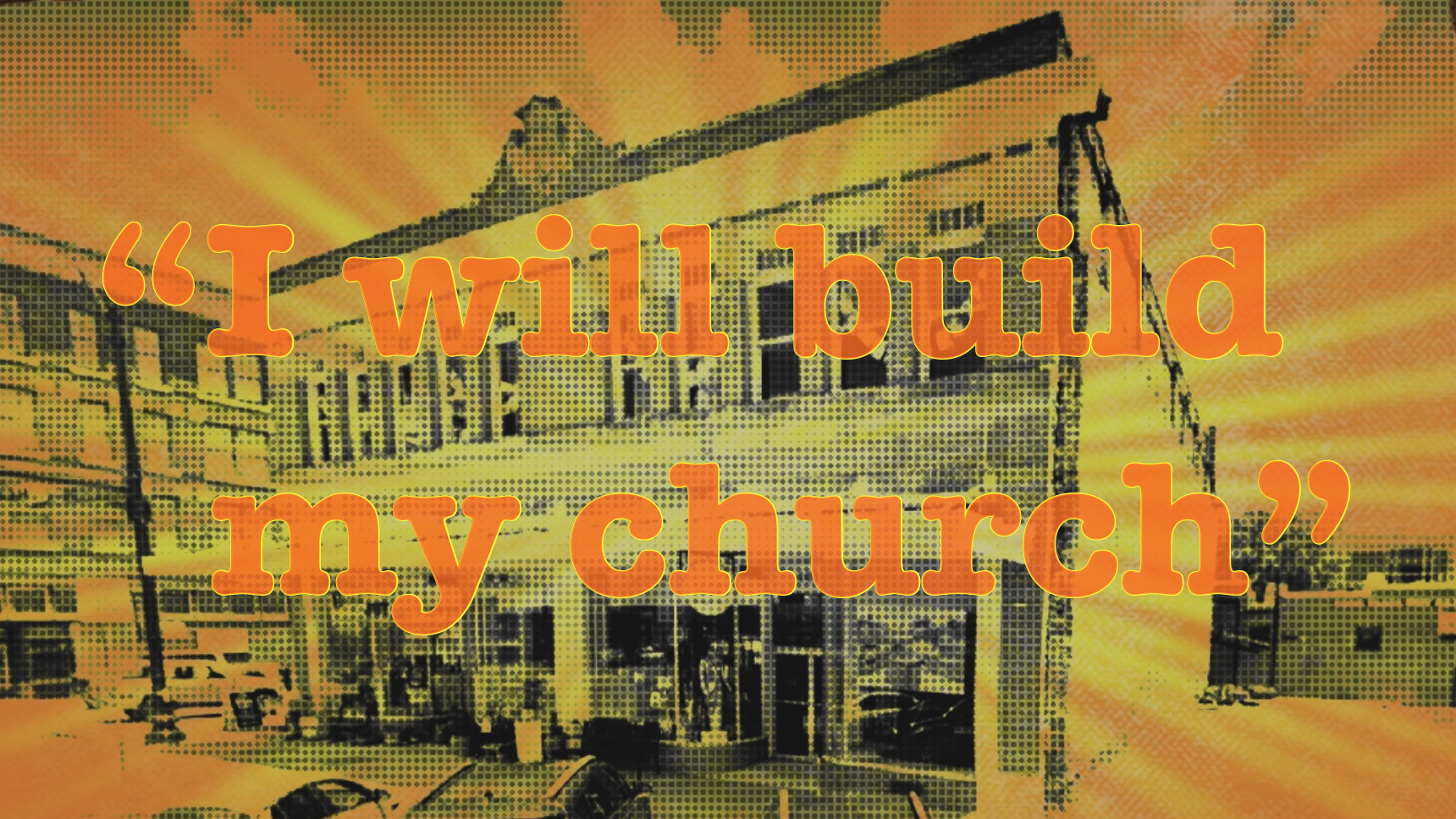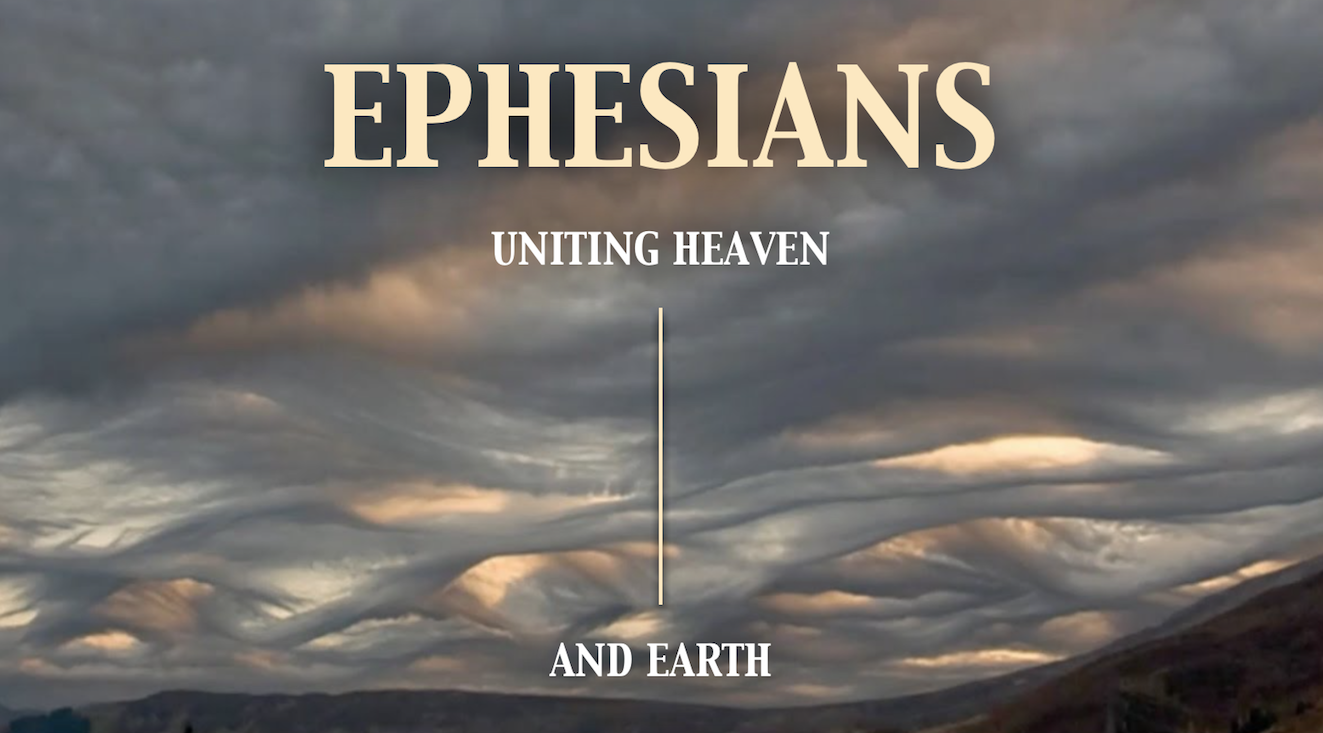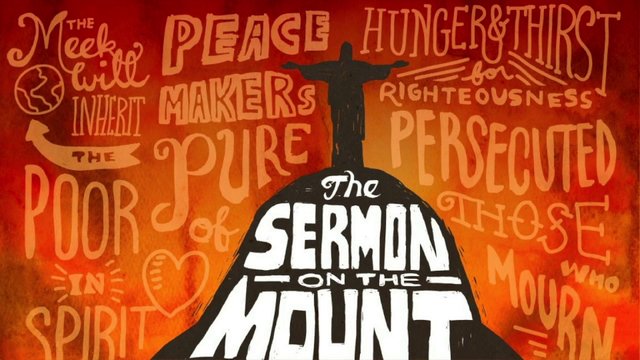
Current Series
Beginning January 5, we will continue our 52-week journey through the story of Scripture focusing on the theme of New Creation with an exploration of the Gospel of John.
Come discover Jesus as you have never known him and who you are because of what he has done, in this, the greatest story of beginning again.
This is the first sermon in our new series on the Gospel of John. In this teaching, we learn the purpose for which John has written his Gospel, the way he wants us to understand what he has written, and the effect his Gospel will have upon those who will believe it.
The Gospel of John is the second stop on our 52-week journey through the story of Scripture focusing on the theme of New Creation.
This is the second sermon in our series on the Gospel of John. In this teaching, we discover the first of several themes that are presented in the prologue of John's Gospel. This week we discussed Jesus as the Word of God and what that means for the world.
The Gospel of John is the second stop on our 52-week journey through the story of Scripture focusing on the theme of New Creation.
This is the third sermon in our series on the Gospel of John. In this teaching, we discover the second of several themes that are presented in the prologue of John's Gospel. This week we discussed Jesus as the light of life for the world.
The Gospel of John is the second stop on our 52-week journey through the story of Scripture focusing on the theme of New Creation.
This is the fourth sermon in our series on the Gospel of John. In this teaching, we discover the third of several themes that are presented in the prologue of John's Gospel. This week we discussed Jesus as the one who gives life to those who are born of God.
The Gospel of John is the second stop on our 52-week journey through the story of Scripture focusing on the theme of New Creation.
This is the fifth sermon in our series on the Gospel of John. In this teaching, we discover the fourth of several themes that are presented in the prologue of John's Gospel. This week we discussed Jesus as the new and better tabernacle of God dwelling with his people.
The Gospel of John is the second stop on our 52-week journey through the story of Scripture focusing on the theme of New Creation.
This is the sixth sermon in our series on the Gospel of John. In this teaching, Dan Hutchins leads us through John 1:19-34 where we are introduced to John the Baptist.
The Gospel of John is the second stop on our 52-week journey through the story of Scripture focusing on the theme of New Creation.
This is the seventh sermon in our series on the Gospel of John. In this teaching, we close out chapter 1 by taking a look at verses 34-51 and considering the evangelistic chain reaction that happened as a result of John the Baptist's witness about Jesus.
The Gospel of John is the second stop on our 52-week journey through the story of Scripture focusing on the theme of New Creation.
This is the eighth sermon in our series on the Gospel of John. In this teaching, we see the first of Jesus's signs that lead us to believe that he is the Christ the Son of God. We find that Jesus is the one who brings the better wine that never disappoints.
The Gospel of John is the second stop on our 52-week journey through the story of Scripture focusing on the theme of New Creation.
This is the ninth sermon in our series on the Gospel of John. In this teaching, we look at John 2:12-25 and consider the cleansing of the Temple.
The Gospel of John is the second stop on our 52-week journey through the story of Scripture focusing on the theme of New Creation.
This is the tenth sermon in our series on the Gospel of John. In this teaching, we look at John 3:1-13 and consider what it means to be born again.
The Gospel of John is the second stop on our 52-week journey through the story of Scripture focusing on the theme of New Creation.
This is the eleventh sermon in our series on the Gospel of John. In this teaching, we look at John 3:14-15 and Jesus as the exalted Son of Man.
The Gospel of John is the second stop on our 52-week journey through the story of Scripture focusing on the theme of New Creation.
As providence would have it, we find ourselves as a church in a very interesting passage of Scripture on Easter morning as we inch our way through the Gospel of John. It is a single verse that Martin Luther called the Bible in miniature because it sums up, in condensed form the essential truths of the entire story of redemption in 24 words. Namely, that God loves bad people and that he was willing to give his life, to give his Son over to death so that sinners might live.
This is sermon thirteen in our series on the Gospel of John. In this teaching, we look at John 3:16-21 and consider those who love darkness and those who live for God and love Jesus.
The Gospel of John is the second stop on our 52-week journey through the story of Scripture focusing on the theme of New Creation.
This is our fourteenth sermon in our series on the Gospel of John. In this teaching, we look at John 3:22-30 and the corrosive sin of jealously.
The Gospel of John is the second stop on our 52-week journey through the story of Scripture focusing on the theme of New Creation.
This is our fifteenth sermon in our series on the Gospel of John. In this teaching, we look at John 4:1-26 and the story of the Samaritan woman at Jacob’s well.
The Gospel of John is the second stop on our 52-week journey through the story of Scripture focusing on the theme of New Creation.
This is our sixteenth sermon in our series on the Gospel of John. In this teaching, Rich Hart looks at John 4:27-42 and continues the story of the Samaritan woman at Jacob’s well, this time from Jesus’ perspective, as he leads his disciples to reorient their hearts around his love for those who are lost.
The Gospel of John is the second stop on our 52-week journey through the story of Scripture focusing on the theme of New Creation.
This is our seventeenth sermon in our series on the Gospel of John. In this teaching, we look at John 4:43-54 and the story of the healing of the official's son.
The Gospel of John is the second stop on our 52-week journey through the story of Scripture focusing on the theme of New Creation.
This is our eighteenth sermon in our series on the Gospel of John. In this teaching Pastor Josh, looks at John 5:1-15 and tells John’s story of Jesus at the Pool of Bethesda.
The Gospel of John is the second stop on our 52-week journey through the story of Scripture focusing on the theme of New Creation.
This week we jumped back into our study of the Gospel of John. And we looked at Jesus and how he watched his Father work so that he would understand where and when he should be working. We also talked about the injustice of fatherlessness and the effect that it has on society, and what our responsibility and role are as a church, to watch and join the Father as he works in Waxahachie.
The Gospel of John is the second stop on our 52-week journey through the story of Scripture focusing on the theme of New Creation.
In this Sunday’s teaching, we discovered that the saying is true, the road to hell is paved with good intentions. The Pharisees get a bad rap but they were not always the bad guys. They started off well but ended up in a really bad place. And though our situations look different today and many centuries have passed, there is significant potential that yet exists for us to make the same mistakes that the Pharisees made.
The Gospel of John is the second stop on our 52-week journey through the story of Scripture focusing on the theme of New Creation.
This week we experienced John 6 in a way that we typically don't experience the story of the Feeding of the 5000. Rather than experiencing it through the eyes of Jesus’ disciples, we experience it instead through the eyes of the 5000 men who followed Jesus into the wilderness. And what they wanted from Jesus might surprise you.
The Gospel of John is the second stop on our 52-week journey through the story of Scripture focusing on the theme of New Creation.
In this teaching on John 6:15-21, Pastor Josh teaches us why Jesus walked upon the water. Jesus was not simply trying to get people to believe what he said about himself by doing extraordinary displays of power, he was doing what he did to show his people who he actually was.
The Gospel of John is the second stop on our 52-week journey through the story of Scripture focusing on the theme of New Creation.
In this teaching on John 6:22-36, we find Jesus in synagogue worshipping with his disciples the day after he walked across the lake. But they are not alone. The crowd that tried to take him as king the day before have chased after him and found him in Capernaum. And now they are looking to be fed by Jesus again but he will not have any of it. Find out why he will not feed them and how we are often just like these men.
The Gospel of John is the second stop on our 52-week journey through the story of Scripture focusing on the theme of New Creation.
This week we use John 6:35-51 to take a peek back at the underlying context of John 6 and Jesus' “Bread of Life” speech, the Exodus story found in Exodus 14-17. If we are to properly understand what is happening in John 6 we must understand the backstory that Jesus is hi-lighting for us.
The Gospel of John is the second stop on our 52-week journey through the story of Scripture focusing on the theme of New Creation.
This week Dan wraps up John chapter 6 with a look at verses 47-71. What we discover is the shocking claim that no one comes to Jesus unless the Father has given them to him. No one works or believes on his or her own without the Father who gives life.
The Gospel of John is the second stop on our 52-week journey through the story of Scripture focusing on the theme of New Creation.
This week in John 7 we find Jesus leaving Galilee for Jerusalem for the last time and entering the city during the Feast of Tabernacles. This is not insignificant. In this chapter, we have Jesus declaring that he is the Living Water that could fully satisfy their longings for salvation, their hope for a future in God’s kingdom, and to fulfill the expectations that the Feast of Tabernacles had created in their hearts.
We apologize for the audio.
The Gospel of John is the second stop on our 52-week journey through the story of Scripture focusing on the theme of New Creation.
This week in John 8 we find Jesus teaching at the Temple during the Feast of Tabernacles and calling himself the Light of the World. Dan helps us understand the historical and Hebraic significance of what that claim meant to the people Jesus was speaking to and what it means for us today.
This week we take a step back to examine a controversial passage of the Gospel in John 7:53-8:11. Many scholars today doubt the authenticity of the passage, whether it was originally part of the Gospel story or a later addition based on a tradition in Jesus' story. We examine the story and find some remarkable insights in this passage that connects this episode in the John back to the Old Testament and paints a beautiful portrait of God's mercy towards sinners.
This week we consider the nature of belief in John's Gospel as we make our way through John 8. There is a lot riding on our understanding of what John means when he says that certain people believe in Jesus because we see some who believe unto life and others who believe unto their own destruction.
This week we consider finish out John 8. Jesus finally reveals himself to the Jewish leaders in Jerusalem. Jesus is not simply a man and he is not merely a prophet, priest, and king. Jesus is God Almighty.
We take a moment to reconsider a passage in the Gospel of John that we have previously covered. Jesus' cleansing of the temple in John 2.
In this teaching, we think about the deeper theological reason why Jesus cleansed his Father's house and how it may be connected with a very strange but important passage about leprosy that is found in Leviticus.
This week we jump back in the Gospel of John after a four-month break.
John 9 gives us the very unusual episode of Jesus healing a blind man using mud and spit. As weird as that might at first appear not everything is at it seems in this story.
Listen to find out why and how Jesus used dirt and spit to prove that he was Lord God Almighty.
Have you been bullied, abused, or hurt by a person in a position of authority over you? Jesus sees that and he will vindicate his abused lambs.
This week we are in John 10 and looking at the Good Shepherd discourse. There is far more to this passage in John than meets the eye. It is a passage that you cannot fully appreciate unless you understand Israel's story. Listen along as we explore the backstory that allows us to see the real story of what Jesus is saying.
This week we looked at the last half of John 10.
To truly appreciate what happens in this passage we looked outside of Scripture to the apocryphal book of 1 Maccabees to understand the story of Hanukah that underlays this fascinating chapter in John.
This week we looked at the last half of John 11.
In this teaching we discover that the resurrection is not merely an event somewhere off in the future but a person. Jesus is the resurrection and the life.
This week we looked at the first half of John 13.
Washing one another's feet?
Why did Jesus do that? What does it mean? And why should we do it?
This week we looked at the last half of John 13.
Judas followed Jesus for three years when he sold him for 30 pieces of silver. Why would he do that? How could he do that? And how might we be in danger of becoming someone just like Judas?
This week we looked at the end of John 13.
In this teaching, we talk about the darkness that swallowed up Judas and how that darkness may be looking for us.
This week we looked at John 14.
Jesus has been with his disciples for 3 years. He has been their friend, he has trained them, and now he is going somewhere that they cannot go. And now he begins to explain to them what they need to know about what is about to happen and how they should prepare themselves for the work ahead of them.
This week we return to John 14.
Jesus has been with his disciples for 3 years. He has been their friend, he has trained them, and now he is going somewhere that they cannot go. And now he begins to explain to them what they need to know about what is about to happen and how they should prepare themselves for the work ahead of them.
This week we jump into John 15.
When Jesus says he is the true vine and that you are the branches, what do you think that means?
It might not mean what you think it means.
When Jesus says that if you abide in him you will bear much fruit and branches that do not bear fruit will be cut off and thrown into the fire, what do you think that means?
It might not mean what you think it means.
This passage is easily misunderstood. And that misunderstanding has created a lot of dread and hopelessness in the hearts of God's people. Don't let this passage confuse you any longer. There is life, joy, and love for you in John 15.
In the last half of John 15, we find Jesus preparing his disciples for the inevitable persecution they will have to experience as his followers. They are not of this world just as Jesus is not of this world. But because they remain in the world they will face trouble on their kingdom mission.
What does that mean for the church today? Who hates us? And what is an appropriate reason to be hated? Those are a few of the questions that we attempt to answer in this teaching.
John 17, commonly called the High Priestly Prayer, wraps up Jesus' farewell discourse to his disciples. While John 17 is aptly named, High Priestly may not say enough about what is happening in the chapter. This prayer is the prayer of a husband for his betrothed as he prepares to leave her for his father's house to prepare a place for them to live. And it tells the story of a marriage arranged by a father for his son.
This prayer of Jesus for his chosen people in John echos the story of the Lord and his chosen people in the Hebrew Scriptures. What the Lord does for Israel in the old creation Jesus does for Israel in the new creation. This is how John shows us that Jesus truly is the Christ and the Son of God.
We continue our look at John 17, Jesus' prayer for his betrothed people whom he was about to leave, and we focused in on the oneness that he wanted for his people.
The unity that Jesus desires for his people is far more than simply wanting us to get along with one another so that unbelievers would see that Christians are a nice group of people and want to join our churches. That kind of unity is not uncommon and not compelling enough to prove that Jesus actually loves the world and was sent from the Father to save it.
The kind of oneness that Jesus is praying for has to fit within the larger goal that John has for his Gospel. Namely, proving that Jesus is the Christ and the Son of God. And to prove those things to enquiring Jews meant that Jesus had to fulfill prophecies in the Hebrew Scriptures that looked forward to the time when God would reunite the divided kingdoms of Israel and Judah and cause the nations to stream into them.
It is this context that helps us understand how we should live as one today and bring outsiders who are different from us into that communion.
This week we looked at John 18:1-27 when the betrayal in Judas' heart against Jesus had finally reached its full climax in the Garden of Gethsemane. But who was actually in charge in that situation? Was it Judas, the Romans, the High Priest, or Jesus?
In this week's teaching we take another look at John 18 but this time from a slightly different direction.
When Jesus announced to the cohort of Roman soldiers that came to arrest him that he was Jesus of Nazareth something very peculiar happened. The soldiers are immediately thrown back and to the ground and Peter responds by pulling out his sword and slicing off the right ear of the High Priest's servant, Malchus. Very peculiar, indeed! But was this the first time that something like that has happened in the story of Israel?
There is another story in 1 Samuel 14 that shares a lot of similarities to this story that we find in John 18. And when we compare the two we come away with a greater appreciation for who Jesus is, the revolution he began, and what Peter did not yet understand.
In this week's teaching Pastor Josh finishes up John 18 with a look at the trial of Jesus.


